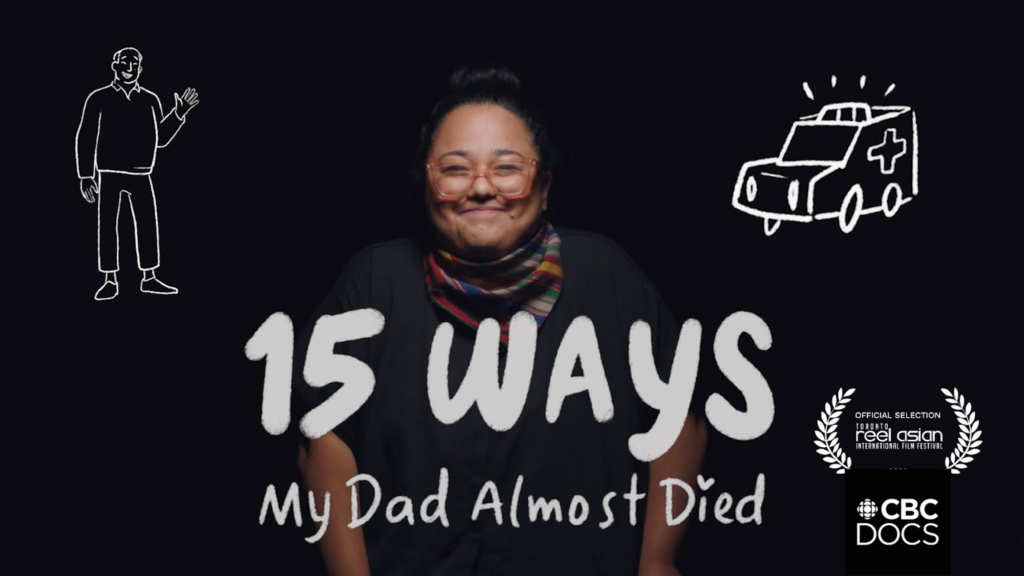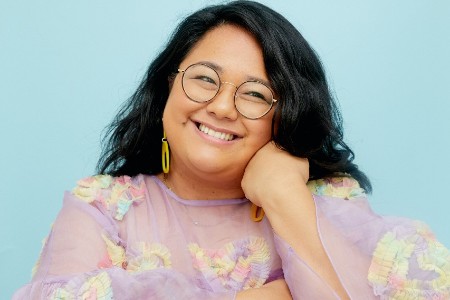The highly anticipated docu-comedy short film 15 Ways My Dad Almost Died, directed by award- winning filmmaker Sura Mallouh and written by Filipina Dora-nominated comedian Alia Rasul.
The short film also had its world premiere at the 2024 Reel Asian Film Festival and is now available for streaming on CBC Gem and YouTube, bringing this heartfelt, humourous and important story to audiences across Canada.
15 Ways My Dad Almost Died chronicles Alia connecting with her father, Amroussi, as she tries to mine his ridiculous number of near-death experiences for comedic material. What begins as lighthearted storytelling transforms into a deeper exploration of forgotten history and the power of oration. Alia uncovers her father’s harrowing experiences during the siege of Jolo in 1974, a tragic event in the southern Philippines that resulted in immense loss of life and destruction. The siege led to widespread civilian casualties and the destruction of homes and livelihoods. A media blackout at the time, kept much of the world from learning the full extent of the atrocities. This year marks 50 years since Jolo was razed to the ground, and to this day, has not been restored and is rarely talked about.
In lead up to the film’s online premiere, Alia took time to be part of my 5 Questions With… series.
5 Questions With… Alia Rasul
HM: Thank you for taking the time to answer a few questions about your film 15 Ways My Dad Almost Died. Perhaps you can start by sharing how long ago did the idea to record your conversations with your dad, Amroussi, and put them into film began.
AR: It was during lockdown in 2020, when my family was on Zoom everyday when the idea came about to document my father’s hilarious near death experiences. The film’s director, Sura Mallouh came on board and we began filming in 2021.
HM: In the film, what we think will be a comical way to explore your father’s near misses with death, soon becomes something much more. Like you, through the film, we learn about the violent event in his hometown during the Jolo Siege of 1974. Could you please share how learning about this so well known event in Filipino history has influenced your work as storyteller?
AR: First, it made me reflect on how I draw from my own heritage and Filipino identity to write comedy. Oftentimes, it is very easy to be reductive for the sake of laughs; making fun of the accent for example. I have definitely been guilty of that. Now that I am wide awake to the fact that our people, including my father, have survived many things in order for me to learn about our heritage and our stories – I feel more of a responsibility to make comedy that is thoughtful, and that honours our legacy.
Second, the fact that something so horrendous could happen to my own father, without me knowing shook me. The fact that his hometown, Jolo, was razed to the ground in 1974, and has not been rebuilt even after 50 years angers me. There are a lot of gaps in Philippine history taught in schools, and it made me wonder about other stories like my father’s that we just simply don’t know about. I am now prioritizing work that empowers people to tell their stories.

HM: As follow up to the previous question, I am also thinking about the importance of ongoing conversations with our elders – such as our parents. And how these types of honest conversations are so necessary especially for children of immigrant parents who might think not talking about this is ‘for the best’. Any thoughts on this?
AR: “Those who cannot remember the past are condemned to repeat it.” I always think about this quote these days. In the context of the world today, with climate change at the front door, and with rising tensions across the world, it feels more urgent that we collectively make informed decisions for the greater good. We should know our history.
HM: I also want to mention I really appreciate the way you and the team behind this film decided to combine verité footage, straight-to-camera stand-up, and animation to give us a full picture, so to speak. Can you share if the idea to mix these elements was something you had thought about or did this come from working with your director Sura Mallouh and other production team members?
AR: It was mostly our director, Sura Mallouh, who laid out a vision for how we were going to make a documentary about a history that was erased and therefore did not have a lot of documentation to work with. With all of its different elements, the film was quite complex to pull together which is why it took some time. It also took a massive effort by a whole village of amazing collaborators to make this film and I am very grateful that we now have a time capsule of my father’s memories.
HM: Congratulations on 15 Ways My Dad Almost Died premiering at Reel Asian this year! What are your hopes for audiences to learn, experience, or think about after seeing the film?
AR: I hope it inspires people to be curious and to ask their loved ones about their stories, and I hope it inspires people to look up the Jolo Siege of 1974.






